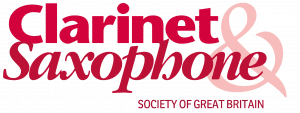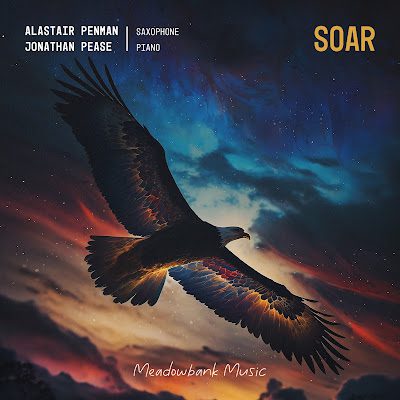The following review is taken from the Autumn 2023 issue of Clarinet & Saxophone magazine. For more reviews, news, and features from the single-reed world, join to receive our quarterly magazine and other membership benefits.
SOAR
Alastair Penman (saxophones) and Jonathan Pease (piano)
Meadowbank Music
This new album from saxophonist Alastair Penman and pianist Jonathan Pease is a polished account of a longstanding musical relationship, featuring tremendous playing throughout. It is a more conventional album than might be expected from Penman, whose previous releases have combined saxophones with electronics, but it is interesting to hear him put his own personal stamp on the traditional saxophone and piano format, ably assisted by Pease.
The opening work, Iturralde’s spirited Pequena Czarda, is probably the best-known piece here. This performance easily rivals any other in terms of technical mastery, interpretation and ensemble. Four Country Dances by Richard Rodney Bennett make an attractive second item, and Penman’s soprano sound is remarkably mellow (otherwise, the album mainly features the alto).
Two pieces by Andy Scott are next: Three Letter Word, then And Everything is Still. Scott’s music is always effective, and the inclusion of these works perhaps pays tribute to Scott’s teaching and wider influence at the Royal Northern College of Music, where Penman studied after Cambridge University. The French composer Robert Planel’s Prelude et Saltarelle, a pleasant mid-20th century recital work, comes next, lovingly performed.
Soar is the album’s title work and Penman’s own composition. Telling the story of an injured eagle slowly returning to flight, it is a gently flowing and subtly affecting piece. Lullaby by Paul Mitchell-Davidson continues in a similarly expressive vein, with Penman back on the soprano.
Jenni Watson’s duo arrangement of Debussy’s Doctor Gradus ad Parnassum, originally for solo piano, was first presented at the World Saxophone Congress. The arrangement gives many of the work’s flurrying semiquaver passages to the alto, which must have impressed the congress, but it rather sacrifices the liquid lightness of the original. It works well as a short burst of fireworks, however.
As we head towards the end of the programme, Amy Quate’s three-movement work Light of Sothis is another reflective, songlike work with peaceful outer movements and a fiery central movement. The final piece is Demersseman’s Carnival of Venice (arr. Hemke), a frothy and suitably exciting denouement.
Penman and Pease first met while studying together at Cambridge. There is a sense here of a natural musical partnership that comes across as effortless, and a repertoire that has grown organically over time. Congratulations to both – and to Penman for launching this album on a newly established label.
Chris Walters


